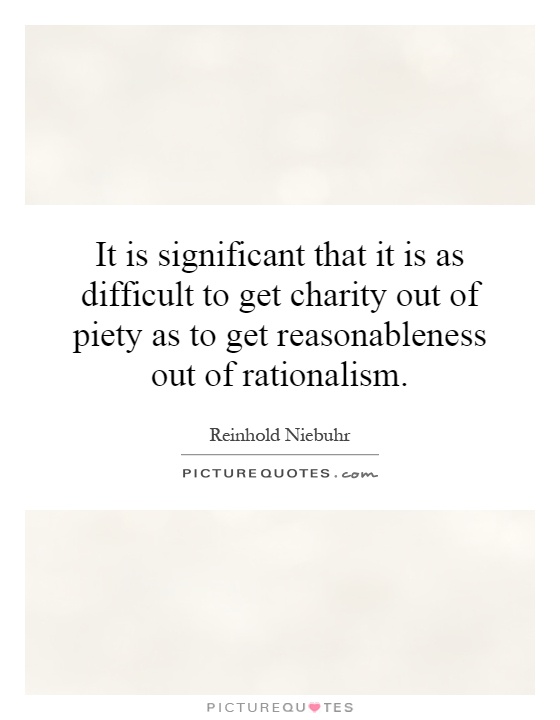It is significant that it is as difficult to get charity out of piety as to get reasonableness out of rationalism

It is significant that it is as difficult to get charity out of piety as to get reasonableness out of rationalism
Reinhold Niebuhr, a prominent theologian and political thinker, was known for his deep understanding of human nature and the complexities of morality. His quote, "It is significant that it is as difficult to get charity out of piety as to get reasonableness out of rationalism," speaks to the challenges inherent in both religious and secular approaches to ethics.In the context of Niebuhr's work, this quote can be interpreted as a critique of the limitations of both religious and rationalistic worldviews when it comes to fostering true compassion and understanding. Piety, or religious devotion, can sometimes lead to a self-righteous attitude that lacks genuine empathy for others. In the pursuit of moral purity, individuals may become judgmental and intolerant of those who do not share their beliefs. This can hinder the practice of charity, which requires a willingness to see the humanity in all people, regardless of their differences.
On the other hand, rationalism, or the belief in reason and logic as the primary sources of knowledge, can also fall short when it comes to promoting compassion and empathy. A purely rationalistic approach to ethics may prioritize efficiency and utility over the needs and feelings of individuals. This can lead to a cold and calculating mindset that values logic over human connection.
Niebuhr's quote suggests that true charity and reasonableness require a balance of both piety and rationalism. Charity, or the act of showing kindness and compassion to others, must be grounded in a deep sense of humility and empathy. It cannot be reduced to mere religious duty or intellectual calculation. Similarly, reasonableness, or the ability to think and act in a fair and logical manner, must be tempered by a sense of moral responsibility and compassion for others.












 Friendship Quotes
Friendship Quotes Love Quotes
Love Quotes Life Quotes
Life Quotes Funny Quotes
Funny Quotes Motivational Quotes
Motivational Quotes Inspirational Quotes
Inspirational Quotes